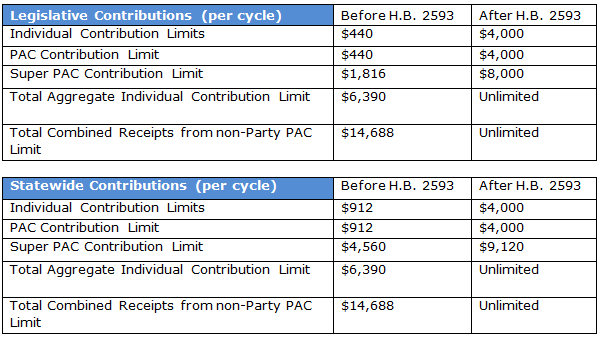State-by-State: Arizona Supreme Court Lifts Injunction on Increased Contribution Limits
Last week the Arizona Supreme Court allowed the state to begin implementing Arizona House Bill 2593, legislation adopted in April 2013 that not only increased the limits on individual state campaign contributions by five-to-tenfold, but also eliminated the state's aggregate limit on individual contributions to candidates and committees who support candidates.
The court did so by overturning a preliminary injunction issued by the State's intermediate appellate court in October, which had allowed the Arizona Citizens Clean Election Commission (the "Commission") to continue to enforce the state's previous limits, which were adopted via a voter initiative in 1998. That initiative, the Arizona Clean Elections Act, established an alternative campaign finance system in which candidates for statewide and legislative office receive public campaign financing if they agreed to limit their fundraising and spending. Alternatively, state candidates who choose not to participate are only allowed to accept individual contributions that are 80 percent or lower than the upper limit for participating candidates. Rather than explicitly setting these limits, the Clean Election Act did so by reference to §16-941 of the Arizona Revised Statutes, which was adopted by initiative in 1986 and established specific, amendable, contribution limits that where increased in 1993, 1994 and 1997.
Rather than changing the alternative campaign finance system adopted by the Clean Elections Act, House Bill 2593 amended §16-941 to dramatically increase the amount individuals and political action committees ("PACs") may give to both participating and non-participating candidates, eliminated overall aggregate limits on how much they could give during election cycles, and split the election cycle between primary and general elections. Contribution limits in the state for non-participating candidates have increased as follows:
View larger image
*Source: Arizona Clean Elections Commission
As a result of the Supreme Court’s ruling, these new limits are effective immediately. However, the court has not yet issued its final decision, which may contain additional explanation regarding how the Commission should treat contributions made during while the implementation of H.B. 2593 was enjoined.

